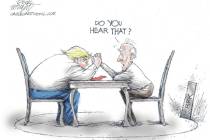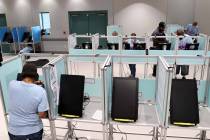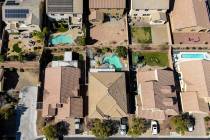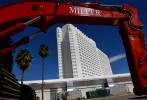Affordable housing returns to Vegas — for some
Las Vegas house prices are in freefall, dropping more sharply than in any other large U.S. city.
This is bad news for those of us who have owned homes here since before the real estate market collapsed. Remember those skyrocketing values we were so giddy about a few years back? Just put them out of your mind and keep the "for sale" sign in the garage.
But as with most things, there's a silver lining. The plummeting values that many of us lament are great news for people who previously could not afford to buy a home in Las Vegas.
A recent headline in the Review-Journal's Saturday real estate section caught my eye, touting a new subdivision with detached homes starting at $129,990.
We're not talking glorified apartments. These are genuine detached houses at a starting price we haven't seen in this millennium.
The headline triggered some memories. My wife and I bought our first house in 1993, a three-bedroom, two-bath resale near Rainbow Boulevard and Cheyenne Avenue.
The price? $88,500.
We got a pretty nice house for that money. It had big front and back yards, lots of space between houses and mature landscaping. Few of us worried much about water back then, so mowing the grass was a daunting chore.
About three years later, we caught the new-home bug. We not only wanted a bigger house but it had to be brand new. We found one near Craig Road and Jones Boulevard. It was a little bigger than the first one and had a decent back yard but the main attraction was that it was still under construction.
The price? $112,000.
At the time, we thought that was quite a bit of money. We lived there for more than six years, finally moving up to the house we own today.
In those days, Las Vegas growth was attributed in large part to housing affordability. People who couldn't afford to buy a house in California could move here and live very comfortably. Couples who worked in blue-collar resort jobs could buy a house in the suburbs.
This all changed in 2004 when Las Vegas real estate went crazy. At the time, many of us thought it was just the most wonderful thing, an opportunity to reap a just reward for all our hard work. Our current home roughly doubled in value, according to an appraisal. We were ecstatic.
Most of us didn't know -- or didn't want to believe -- that it was all a mirage, an artificial and temporary state. Some folks cashed in, while many others jumped in too late, paying way more than they could afford.
When the mirage vanished, it left behind some very real carnage. Foreclosures are just part of it. Some home builders who couldn't sell any homes packed up and moved to greener pastures -- or just packed up. Others have gone into hibernation, waiting for better times. A few stalwarts have stuck it out, but they've had to drop their prices dramatically to entice people just to take a stroll through their model homes.
We haven't seen anything like this in Las Vegas since the 1960s.
Yes, Las Vegas has been more or less a boomtown since the '30s. But there have been a few brief periods when things looked bleak. The last was the late '60s. Respected home builder Richard Plaster came to town in 1973, so he doesn't have firsthand knowledge, but he's heard all the stories.
"They were giving away television sets to get people to take houses off their hands," he says.
Then Howard Hughes came to town and changed everything. Secluded in a Desert Inn penthouse suite, the maverick billionaire bought casinos, airports, vast tracts of land and a television station. He promised to do a lot more. And in the process, he almost single-handedly revived the local economy.
After Hughes, there were periods of moderation in Las Vegas, but for the most part consumer confidence remained high and people migrated to the desert in bunches.
Today, we've hit our first bleak time in 40 years. Plaster's Signature Homes has some new houses available for $129,990. They aren't real big, and they aren't exactly in the posh confines of Summerlin, Anthem or Aliante. But they are detached, three-bedroom dwellings, well-suited to the entry-level buyer.
Basically, at that price, Plaster is giving away the land. "The prices aren't covering anything more than the cost of sticks and bricks," he says. "The only reason I'm able to do this is because I bought this land several years ago. We're still able to generate cash from the sales."
Some builders can't do that. They bought their land during the big value run-up. They simply can't afford to sell houses for $129,990. Frankly, because of what they paid for the land, it's a stretch for many of them to price a house below $200,000.
They're doing it anyway. A person in the market for a new home can find quite a few models -- in nice neighborhoods -- for considerably less than $200,000.
And so it's a great time to buy, not only because the houses are affordable but because they're certain to rise in value eventually. Unfortunately, there's another obstacle for the young couple looking to join the homeowner ranks: It's difficult to get a loan.
Back in the glory days of Las Vegas home-buying, my wife and I got a nice house for 3 percent down on a low-interest, state-backed mortgage. We had to come up with a few thousand dollars but it was doable.
Today, interest rates are still historically low, but because of the subprime fiasco, lending requirements have increased substantially. Home buyers must save up a lot more for a down payment now. And that's not easy when the cost of everything -- gasoline, food, health insurance, etc. -- makes it doubly difficult to save.
So, for those who can make the down payment and secure a loan, it's a great time to buy. Those who can't may want to embrace the unconventional view that homeownership isn't all it's cracked up to be. New York Times economics columnist Paul Krugman is a high-profile advocate of this position, noting the financial risk, the disadvantage of being tied down in a mobile job market, and the rising cost of commuting from suburban neighborhoods.
"Homeownership isn't for everyone," he writes. But the dream may be too deeply ingrained in the American psyche to believe him.
Geoff Schumacher (gschumacher@reviewjournal.com) is publisher of Las Vegas CityLife, an alternative newsweekly owned by the same company as the Review-Journal. He also is the author of "Sun, Sin & Suburbia: An Essential History of Modern Las Vegas" and "Howard Hughes: Power, Paranoia & Palace Intrigue." His column appears Sunday.























